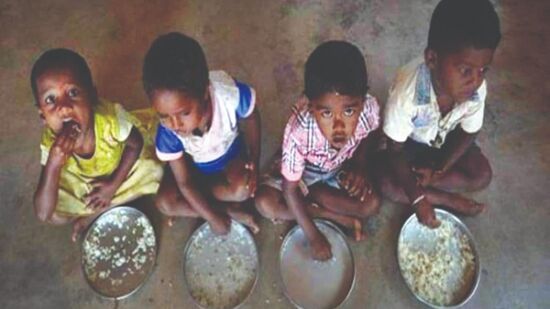States asked to identify children with severe acute malnutrition for referral to hospitals

New Delhi: Identifying severe acute malnutrition (SAM) in children and their referral to hospitals, using AYUSH concepts and monitoring through 'Poshan Tracker' are among highlights of the government's new guidelines which aim to improve nutritional status of children and women in the country.
In a letter to all states and UTs, the Women and Child Development Ministry asked all chief secretaries to launch a drive for identification of severe acute malnutrition in children for referral to hospitals, if required, and AYUSH centres and complete this exercise by January 31.
"The states shall launch a drive for identification of SAM children for referral to hospitals (if required) and AYUSH centres in accordance with the detailed action plan approved by the District Nutrition Committee to be finalised in consultation with the Chief Medical Officer. This exercise shall be completed by January 31, 2021," the ministry said.
The ministry shared the guidelines and stressed on the need to ensure that entitlements of Supplementary Nutrition Programme reach the intended beneficiaries in a time-bound manner as per quantity and nutritional standards.
The ministry said it has streamlined guidelines on quality assurance, roles and responsibilities of duty holders, procedure for procurement, integrating AYUSH concepts and data management and monitoring through 'Poshan Tracker' for transparency, efficiency and accountability in delivery of supplementary nutrition.
The ministry has asked all states to mandatorily implement POSHAN Tracker that uses centralised data architecture to align with digital technology systems of other ministries and programs.
"The system provides a digital identity to each beneficiary and generates automated alerts to the critical last mile beneficiaries. lt also ensures efficient audit of the delivery system by documenting real time attendance of beneficiaries and duty bearers," the ministry said in the letter issued on January 13.
The tracker also gives a robust digital technology platform and management information system with help the nutrition mission to scale efficiently, thereby generating significant positive impact and documentation thereof, the ministry said.
The ministry has also asked for integrating AYUSH concepts for holistic nourishment.
"The science of AYUSH is a system that builds and promotes health and wellness and can address the requirements of nutrition by tapping into the country's indigenous traditional practices," it said.
The ministry said PoshanVatikas (kitchen gardens and nutri-gardens) shall be set up where benefits can easily be given to women and children.
The main objective of introducing the concept of PoshanVatika is to encourage community members to cultivate local food crops in their backyards. PoshanVatikas can meet the important dietary diversity gap that has been repeatedly revealed in different surveys by providing different fruits, nuts, herbs and vegetables round the year, thus helping in introducing healthy eating practices to address malnutrition, the ministry said.
The ministry said AYUSH will propagate the campaigns of 'Yoga at Home, Yoga with Family' at AWCs and households to encourage beneficiaries to practice yoga and stay healthy.
Speaking about the new guidelines, Dr SujeetRanjan, Executive Director, The Coalition for Food and Nutrition Security, New Delhi said these guidelines further establish the commitment of the government to improve nutritional status of children and women through POSHAN Abhiyaan.
These guidelines have focused on early identification of children with severe acute malnutrition in the community and refer to the facility. However, given the scale of SAM burden in India, community-based management is the best way that many children can be treated, as facility-based treatment can address only a small percentage of children with SAM, he said.
"These guidelines are providing a direction at both system and community level with the synergistic engagement of stakeholders from various sectors and an overall involvement of the community," he said.
Dr. Khan Amir Maroof, Professor, Department of Community Medicine, University College of Medical Sciences and GTB Hospital said the challenge of grassroot implementation remains.
"I would mainly comment on the Poshan Tracker. Technology is as good as those using it. The digital competency of our grassroot workers need a major boost. Not only upskilling, but added manpower is needed, if data recording needs to be kept in paper as well as digital formats. More research is needed to find out feasibility of a paperless system of record keeping," he said.
The involvement of the AYUSH system will be a welcome addition to the efforts to improve nutrition. This will add more manpower and converge health along with nutrition platforms.
The manner in which this AYUSH system will support this need to be seen. It would be better if the existing supportive supervision system is strengthened in ICDS. It can even be done by involvement of Community Medicine departments of medical colleges in respective districts," he added.
The National Family Health Survey-5, which was released in December, found that malnutrition increased among children in 2019-20 from 2015-16 in 22 states
and UTs.



